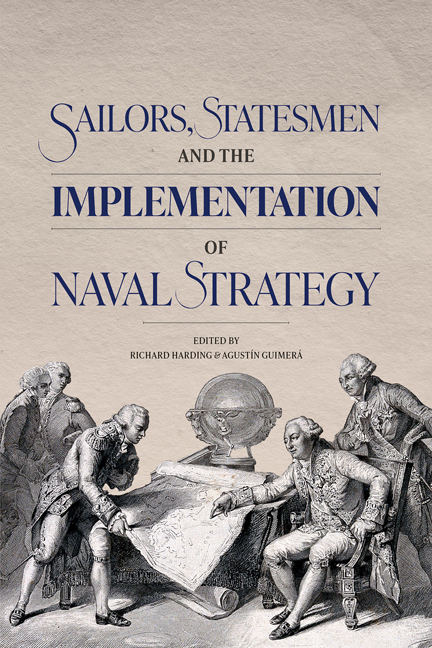Book contents
- Frontmatter
- Dedication
- Contents
- List of Contributors
- Introduction: Naval Leadership: Expertise and Strategy
- 1 The Evolution of French Naval Leadership: Defining the Admiralty of France from the Sixteenth to the Eighteenth Century
- 2 The Makers of Spanish Naval Strategy in the Eighteenth Century: Strategy, Tactics, and Shipbuilding Policy
- 3 Naval Strategic Leadership in Britain, 1739–1748: Political Leaders and Professional Knowledge
- 4 The Statesman and the Naval Leader: The Count of Floridablanca and Navy Minister Antonio Valdés, 1783–1792
- 5 Defining French Eighteenth-Century Naval Strategy
- 6 Casto Méndez Núñez: The Admiral who could have been Regent, 1861–1868
- 7 Teaching by Example: Julian Corbett’s The Campaign of Trafalgar of 1910
- 8 Spanish Naval Leadership during the Second Republic: José Giral Pereira
- 9 The Quest to Understand Naval Leadership: Educating Admirals for High Command in the U.S. Navy from the Eighteenth Century into the Twenty-first Century
- 10 Reflections
- Bibliography
- Index
8 - Spanish Naval Leadership during the Second Republic: José Giral Pereira
Published online by Cambridge University Press: 08 May 2024
- Frontmatter
- Dedication
- Contents
- List of Contributors
- Introduction: Naval Leadership: Expertise and Strategy
- 1 The Evolution of French Naval Leadership: Defining the Admiralty of France from the Sixteenth to the Eighteenth Century
- 2 The Makers of Spanish Naval Strategy in the Eighteenth Century: Strategy, Tactics, and Shipbuilding Policy
- 3 Naval Strategic Leadership in Britain, 1739–1748: Political Leaders and Professional Knowledge
- 4 The Statesman and the Naval Leader: The Count of Floridablanca and Navy Minister Antonio Valdés, 1783–1792
- 5 Defining French Eighteenth-Century Naval Strategy
- 6 Casto Méndez Núñez: The Admiral who could have been Regent, 1861–1868
- 7 Teaching by Example: Julian Corbett’s The Campaign of Trafalgar of 1910
- 8 Spanish Naval Leadership during the Second Republic: José Giral Pereira
- 9 The Quest to Understand Naval Leadership: Educating Admirals for High Command in the U.S. Navy from the Eighteenth Century into the Twenty-first Century
- 10 Reflections
- Bibliography
- Index
Summary
An examination of strategic leadership in the navy during the Second Republic is of great interest for multiple reasons. These include our current lack of knowledge about the naval sphere and the actions aimed at steering naval policy during those years, the fact that this period coincided with a great upheaval in international politics, and that it was also a period of transformation at home.
Taking only a brief look at the several figures between 1931 and 1936 who were responsible for setting naval policy, we can conclude that, with few exceptions, the continuity, knowledge, and time necessary to develop a policy with any kind of long-range perspective by the Republican government were missing. As a consequence, there was a lack of strategic leadership at a time when the most serious threat to Spain's national security lay in the naval situation.
Going back to the beginning of the century, the Spanish navy had endured incomplete and ill-considered plans, multifarious and discontinued shipbuilding projects, and, in general, the lack of a balanced, viable agenda that was consistent with the country's economic reality. A profound change was therefore needed for the navy to become an efficient tool. The first requirement was to understand its structural problems, the second was to define exactly what was expected of it, and the third was to formulate a plan to invest resources, realistically, in a way that was consistent with the navy's needs and its mission.
One of the Second Republic's naval leaders stands out from the rest, José Giral Pereira (1879–1962), who served two separate terms as minister of the navy (10 October 1931–11 June 1933, and 19 February–18 July 1936). Giral, who was a pharmacist by profession, was the only navy minister to push for a plan aimed at dealing with the main challenges mentioned in the previous paragraph. His plans were ready to be approved in July 1936, but the process was interrupted by the war, and since then they have languished in the navy's archives.
However, because of their quality and sense of direction, they are among some of the best plans formulated in the first third of the twentieth century.
- Type
- Chapter
- Information
- Sailors, Statesmen and the Implementation of Naval Strategy , pp. 141 - 158Publisher: Boydell & BrewerPrint publication year: 2024



